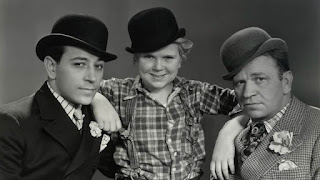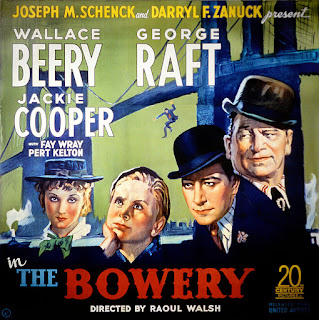Director Raoul Walsh. From the silent screen era into the age of talking films, he directed some films that definitely earned the word "classic" in description. They're classic in quality., not just because they're well over 50 years old. THE ROARING TWENTIES with James Cagney and Humphrey Bogart, THEY DRIVE BY NIGHT and HIGH SIERRA, both starring Bogart and Ida Lupino, and WHITE HEAT featuring one of Cagney's best and most quotable gangster performances were all directed by Walsh. KLONDIKE ANNIE starring Mae West, THE STRAWBERRY BLONDE with Cagney dancing with Rita Hayworth, GENTLEMAN JIM starring Errol Flynn and BATTLE CRY starring Tab Hunter were also in his list of directorial credits. So was BAND OF ANGELS, a 1957 Civil War era race drama/romance starring Clark Gable, Yvonne De Carlo and Sidney Poitier a year before THE DEFIANT ONES, the film that would make him a star. Gorgeous De Carlo stars as a Southern belle who's enjoying white privilege until it's discovered that her real mother was black. Then, the light-skilled belle is booted off the plantation. She's purchased by a dashing gent and moves to his place in New Orleans where he treats her like a lady. The gent (played by Gable, of course) has an educated manservant played by Poitier. In this Walsh film, screen newcomer Poitier displays his early star quality holding his own in scenes opposite screen legend Clark Gable. This big screen, generously budgeted, Technicolor production tries to give you a little GONE WITH THE WIND flavor.
It's interesting to note that Clark Gable shared the screen with two Black actors who went on to make Oscar history. Hattie McDaniel of GONE WITH THE WIND was the first Black person to be nominated for an Oscar -- and she was the first to win. She was voted Best Supporting Actress for the 1939 Civil War epic. Sidney Poitier would be the first Black male to be nominated for an Oscar (Best Actor for 1958's THE DEFIANT ONES) and he'd be the first to win the Oscar (Best Actor for 1963's LILIES OF THE FIELD). Walsh's BAND OF ANGELS may come off like some dated cornpone that makes you giggle at times. For instance, one scene shows dozens of plantation slaves gathered on a hill for a sad farewell. All of a sudden, they burst into song and sound just like the Hollywood studio chorus that sang behind Judy Garland in the "Here's What I'm Here For" number in 1954's A STAR IS BORN. That's BAND OF ANGELS.
However, Raoul Walsh's 1933 drama from 20th Century Fox called THE BOWERY does not make you giggle. If you're Black, Asian, Italian, Jewish or female, I'm sure you'll be offended by something you see or hear in the first ten minutes of this 1933 film. The film stars Wallace Beery, George Raft, Jackie Cooper and Fay Wray. The three male stars get billed above the title. Wallace Beery and Jackie Cooper had previously co-starred in the hit 1931 MGM tearjerker, THE CHAMP. They'd co-star again in MGM's 1934 adaptation of TREASURE ISLAND. In THE BOWERY, Beery pronounces words like "perfectly" as "poi-fectly" and acts as a papa bear to Cooper's character. Raft and the burly Beery (on the right in the pic below) play rivals.
The story takes place in the 1890s, called The Gay Nineties, in a section of New York City that was bustling, bawdy and beer-soaked. THE BOWERY screens Sunday March 31st and Monday at Film Forum in Manhattan's Greenwich Village. The film is part of a program devoted to Fay Wray and her LOST HORIZON (1937) screenwriter husband, Robert Riskin, called BOB & WRAY: A HOLLYWOOD LOVE STORY. Riskin was not involved with writing THE BOWERY.
On Twitter, the Film Forum notice about THE BOWERY includes a short magazine review from Richard Brody of The New Yorker. Brody mentions the racism and atavism in the authenticity of Walsh's film. Mr. Brody took sort a high tea service approach to describing the revolting aspects of the film. He serves it to you like its a dainty cucumber sandwich cut in a triangle shape with the crust removed. Let me give you some of the film's details like a bowl of chili served in a New Jersey diner.
I'm sure the Film Forum will show THE BOWERY in its entirety and uncensored -- as it should. The first shot you see in THE BOWERY is the name of a loud, busy saloon in close-up. The name of the saloon is -- "N****r Joe's," printed in big letters.
In the next ten minutes, you'll see a woman get knocked unconscious then dragged out of the saloon. There are two stereotype Jewish tailors competing for a customer on the street. Jackie Cooper was, like little Shirley Temple, a popular child star. He'd already made Hollywood history by that time as the youngest Oscar nominee, a record he'd hold through the 1970s. Jackie Cooper, at age 9, was a Best Actor Oscar nominee for 1931's family film, SKIPPY. In the first ten minutes of 1933's THE BOWERY, little Jackie Cooper plays the orphan street kid who uses vulgar terms referring to Chinese residents, Italian kids and he says the name of the saloon. All this business is presented with a light-hearted vibe. Fay Wray stars as the element of refinement that comes into the story and into the lives of the three Bowery males.
In the Fay Wray filmography, THE BOWERY was released the same year as her most famous film, KING KONG. That 1933 action/horror movie, one truly deserving of the word "iconic," still stands as a strong allegory for slavery and racial inequality in America while also touching on the taboo Hollywood topic of interracial romance. THE BOWERY came out six months after KING KONG.
If you go to see THE BOWERY March 31st or April 1st, be prepared. The story opens with blunt, racially offensive language and images. For more info, click onto: www.FilmForum.org.
When Raoul Walsh was a silent film actor, he played John Wilkes Booth, the man who assassinated President Lincoln, in D.W. Griffith's highly controversial film, 1915's THE BIRTH OF A NATION.
Subscribe to:
Post Comments (Atom)
Colman Domingo in RUSTIN
In the first ten minutes of Steven Spielberg's LINCOLN, we see Daniel Day-Lewis as Abraham Lincoln talking to two Black soldiers on a Ci...

-
I discovered this documentary series about a year and a half ago on TPT , the Twin Cities PBS station. It immediately became weekend viewin...
-
If you have not seen the short animated feature called HAIR LOVE , a few minutes of gorgeous joy are missing from your life. When I first s...
-
Christina Hendricks was a standout as statuesque, savvy and sophisticated Joan in the MAD MEN television series. She had, what a man once wr...







No comments:
Post a Comment